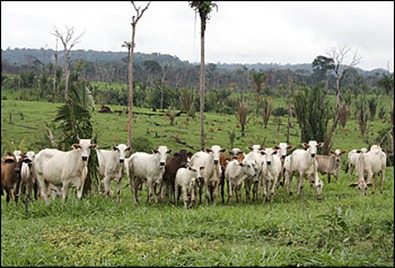A protected Amazon forest's fast decline
Despite Brazilian Policy, Park in Amazon Falls Prey to Farming, Logging and a Lack of Government Resources 
By Joshua Partlow, Washington Post Foreign Service BOM FUTURO NATIONAL FOREST, Brazil — Antonio Elson Portela had already passed acres of charred stumps and rows of corn and coffee plants when he drove up behind a flatbed truck hauling logs out of this Amazonian forest. Brazil is considered a world leader in conserving its environmental bounty. The federal government late last year set ambitious goals to reduce deforestation by 70 percent over the next decade. It has demarcated more than 300,000 square miles as federally protected areas, a territory more than twice the size of the U.S. national park system. But as the case of Bom Futuro National Forest shows, such designations do not always prevent, or even slow, the destruction of the rain forest. Here, across 700,000 acres of Amazon rain forest in the western Brazilian state of Rondonia, poverty pushes settlers in search of new lands, and any attempt by the government to interrupt their destiny has met with resentment and an adamant refusal to leave. … In Bom Futuro, settlers and prospectors have carved out a hard living by cutting trees, despite environmental rules that declare their very presence illegal. And a combination of pressures — farming, logging, cattle ranching, road-building, hunting — and the speed of the forest’s disappearance have brought Bom Futuro to the top of the government’s environmental agenda. Through last May, Bom Futuro had lost nearly 170,000 acres of forest, roughly a quarter of the park. At the current rate of deforestation, environmental officials estimate, half the forest will be pasture in five more years. By 2021, it will be all gone. … One of the settlers who agreed was Cleofas de Oliveira, a 30-year-old farmer who has spent 12 years in Bom Futuro. "I don’t want to deforest — I’m aware now of this new environmental education," he said. "But my father’s generation was different." … Oliveira and others say they are willing to plant new trees and police themselves and the loggers in return for legitimate claim to their land. If a confrontation comes, he said, everyone expects problems. "If they try to move people and do not offer something of value, people would burn the rest of this forest in protest: Okay, if we leave, the forest goes with us."
A Protected Forest’s Fast Decline